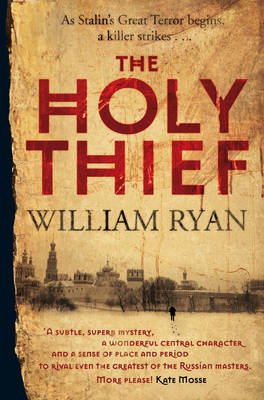
EURO CRIME
Reviews

Ryan, William - 'The Holy Thief'
Paperback: 320 pages (Mar. 2011) Publisher: Pan ISBN: 0330508407
THE HOLY THIEF, out now in paperback, comes plastered in praise from critics and other writers, and the word in the blogosphere is equally positive. You can believe the hype - it would be a challenge not to find this book compelling.
The setting is Stalin's Moscow in 1936, which I suspect is unfamiliar territory to the majority of readers (and certainly to this one). The accusations and persecutions of the 'Great Terror' are just beginning, but it is also a time of great optimism and loyalty to the Soviet state. Deprivation is commonplace but there is a great sense of pride in the air.
Captain Alexei Dmitriyevich Korolev is a veteran of the First World War, a loyal comrade (with secret Christian leanings), and a CID investigator in the Moscow Militia.
The body of a young woman is discovered in the sacristy of a former church and the case is assigned to Korolev as the most experienced man on his team. The woman has been tortured to death, and a cursory examination indicates that electricity has been used. This suggests to Korolev that she was killed by a professional and his suspicions immediately turn to a member of the NKVD, the political police. Korolev is instantly aware that this case could be as dangerous to him as to the perpetrators of the crime and resolves to tread carefully.
To add even more pressure to an already sensitive case, an autopsy by the surgical-spirit-fuelled Dr Chestnova reveals that the girl is a foreigner. The NKVD reveals that the victim is known to them as Maria Kuznetsova, and is a US emigre, and worse still an Orthodox nun, or 'cultist'. Religion and politics are not a safe combination in 1936.
Finally, it soon becomes apparent that the Thieves, Moscow's caste of professional criminals, professionally and personally opposed to the State, tattooed with their life histories, are also involved. Korolev has to go right to the top of their organisation - the Chief Authority 'Count Kolya' himself, in the course of his investigation.
It must be extremely tempting to apply a bit of hindsight to one's characters, but Ryan has resisted the temptation and it makes Korolev all the more interesting that he is a Party man - he has occasional doubts but he is loyal to the Revolution and to Comrade Stalin. The mindset is fascinating. Here is Korolev's boss General Popov, recently denounced and awaiting the meeting that will decide his future:
"I've shed blood for the Party more than once, Korolev, and I'll shed it again if it's needed. We all know the world situation. The Spanish Comrades are losing out against the Fascists, the Germans have crushed the Party there and are pushing out their borders, and the Italians are marching through blood in Africa. Sooner or later they'll come for us - they're already preparing the way with their spies and provocateurs. The Party knows this. We can't let our guard drop - they'll be on us like a flash if we do. If the Party needs an example to remind the department of this, I'm happy to be the example."
Korolev's sidekick Ivan Semionov is also not quite what you'd expect - an optimistic younger man, loyal to the Revolution but not above a bit of cheek to his superiors, and a fashion victim. The Korolev-Semionov dynamic is one of the book's best points:
"He was wearing that blasted mackintosh again. He looked like a corner boy in it, his hair slicked back with some kind of cream. It occurred to Korolev that Semionov would fit right in with the touts selling marked-up train tickets over at Kiev station."
The characters of Gregorin and Larinin are more what I expected to encounter in a book about Soviet Russia. Gregorin is a Colonel in the NKVD, the political police, and keeps a close eye on Korolev's investigation, feeding him information only as and when it becomes useful. Larinin is a political agent who has smeared an experienced detective for joking about the NKVD and has taken his place as an investigator. He is deservedly unpopular amongst his colleagues.
Ryan handles his large cast well, and weaves a good story out of the paranoia, mixed loyalties, idealism and cynicism of the players. THE HOLY THIEF is an excellent book for anyone who likes some history with their mystery.
I award Ryan extra points for dealing with the Russian names in an elegant fashion. I always find books set in Russia tricky to follow as each character seems to have three different name-forms. My deduction (please correct me if I'm wrong) is that Russians habitually refer to one another by their first two names in polite circumstances, but shorten the first name once they are on familiar terms. I took careful note in chapter one of Korolev's names - Alexei Dmitriyevich, or Lyoshka for short - but found my note unnecessary.
THE BLOODY MEADOW, the second in this series, is out now.
Rich Westwood, England
April 2012
More European crime fiction reviews can be found on the Reviews page.